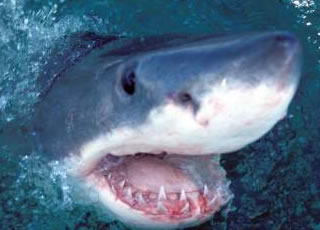Mythconceptions: Sharks don't get cancer
Interview with
Kicking off the first in a new series of 'Mythconceptions', separating science fact from science fiction, Kat Arney takes a look at a a persistent but very fishy tale from the underwater world - the claim that sharks don't get cancer...
from science fiction, Kat Arney takes a look at a a persistent but very fishy tale from the underwater world - the claim that sharks don't get cancer...
Kat - The story starts back in the 1970's, based in legitimate scientific research into ways to stop cancers growing their own blood supply, a process known as angiogenesis, which provides growing tumours with a vital source of oxygen and nutrients.
U.S scientists searching for drugs that could do this, noticed that implanting a small piece of cartilage - that's the rubbery stuff in between joints and on the end of some of your bones- could stop angiogenesis and halt tumours in their tracks. This isn't actually quite as weird as it sounds. Unlike bone, which is shot through with blood vessels, cartilage doesn't have any, so it stands to reason that it must be making some kind of molecule that stops blood vessel growth.
Given that sharks are cartilaginous fish, meaning there skeletons are made entirely of cartilage rather than bones, it was a fairly straightforward mental leap to assume that not only would sharks not get cancer, but their cartilage might also be able to cure it. Indeed, when other researchers tested shark cartilage in the lab, it strongly stopped tumours from growing new blood vessels and, as far as anyone could tell, wild sharks hardly ever seem to get cancer, and experiments exposing sharks to a chemical that causes cancer in humans, had no apparent ill effects. So it all fitted nicely together.
The next leap was the publication of a book in 1992 called "Sharks Don't Get Cancer", which gathered a huge amount of media attention. The man who wrote the book, a Dr William Lane, was convinced that taking shark cartilage pills could cure cancer, despite the lack of actual scientific evidence from patients to prove it, and off the back of that misguided idea, a multi-million dollar industry was born.
Sharks were caught, farmed and slaughtered in their thousands, and eventually in their millions to make ineffective shark cartilage pills that were bought, and taken, by desperate cancer patients. To prove the point, there have been at least three clinical trials showing that shark cartilage tablets are completely ineffective against cancer, providing pretty conclusive evidence that it doesn't work. And yet, shark pills are still on sale in health food shops and alternative medicine stores.
Even worse, the whole idea that sharks don't get cancer is untrue. Although it's very hard to get accurate data on diseases in wild ocean animals like sharks, because those that die from cancer or anything else, tend to sink to the bottom of the sea, rather than handily themselves for counting by scientists, marine biologists have found many examples in plenty of different species of sharks and, in 2013, scientists spotted a large tumour in possibly the most famous type of shark of all, the great white, living off the south Australian coast.
Although the idea, sharks don't get cancer, and that their cartilage can cure it, started off with its roots in proper research, it's ultimately led to the futile death of millions of the important and beautiful ocean dwellers. And even if it was the case that a molecule from cartilage could be effective against cancer, all the same stuff is found in cartilage of other animal parts, such as pigs ears, and pigs certainly aren't endangered in the same way that many shark species are. It's time to sink this myth to the bottom of the briny and leave it there.
- Previous Earth's first water found
- Next Solar Powered Car Race









Comments
Add a comment